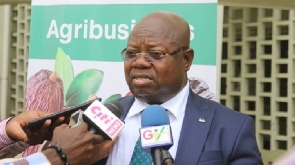 Dr. John Kofi Mensah, Managing Director for ADB
Dr. John Kofi Mensah, Managing Director for ADB
The Agricultural Development Bank (ADB) has set aside GH¢ 500 million to support the poultry industry in Ghana.
In partnership with the Ministry of Food and Agriculture (MoFA), the Bank of Ghana (BoG), the Ghana Incentive-based Risk Sharing System for Agricultural Lending (GIRSAL) and the Out-grower and Value Chain Fund (OVCF),the programme is meant to end the country’s dependence on imported poultry products and create jobs for the youth.
Under the initiative, the ADB will give soft loans to the tune of GH¢ 500million to businesses in the poultry value chain to help de-risk their operations, increase chicken production and cut out the imports.
The first tranche of the facility, amounting to GH¢23 million, has been approved by ADB’s Board and is now ready to be disbursed to six businesses in the Bono Region.
The Managing Director of ADB, Dr. John Kofi Mensah, explained that the initiative was the bank’s support to the government’s Broiler Revitalisation Programme, aimed at increasing domestic production of chicken.
Dr. Mensah said the amount was to be invested between 2020 and 2022 in line with the bank’s strategic plan.
The Ministry of Food and Agriculture (MoFA) is also to provide technical support to the beneficiary businesses under the initiative.
Dr. Mensah described the programme as “a big revival of the poultry industry” that would help spur growth in related sectors, including maize and millet production, provide low cost but quality chicken to hotels and other hospitality sector operators and create thousands of jobs.
He said the initiative would target businesses that engaged in the production of poultry feed, the rearing of the birds, the processing of the meat and the marketing of the chicken to ensure that the entire value was properly funded to help remove the bottlenecks.
With the approval of the first tranche of the facility, the beneficiary businesses would be given between GH¢1.5 million and GH¢9 million to either revamp their businesses or start new ones with the ultimate objective of increasing domestic production of poultry production.
“What is happening is a hatchery will produce, we will get the day-old chicks that will be made available to the selected institutions that will rear them.
“There is another company that will produce the feed for the day-old chicks and the broilers and then it goes to the processor before it moves to the company that will market them,” he said.
He said the funding would mainly target existing businesses with experience in the sector.
National consumption of poultry currently exceeds domestic production by more than 340,000 tonnes, according to the MoFA.
Dr Mensah stated that estimates showed that businesses which would benefit from the facility would be empowered to create additional 50 jobs in the initial stages, with the possibility of scaling it up in the coming months.
In terms of impact on the broiler production per company, he said the poultry producers should be able to double their capacities after receiving the support.
“If you were producing about 10,000 birds per month, you should be able to produce 100,000 birds per week after benefiting from this support,” he said.
He said from the Bono Region, the programme would move to the Ashanti Region, the Greater Accra Region, and the Eastern and Central regions. Dr Mensah said, unlike traditional loans that attracted interest rates above 20 per cent per annum, funds from the bank’s Broiler Revitalisation Programme would attract interest rates below 10 per cent per annum.
He explained that the “exceptionally low-interest rate” on the funds was made possible by the partnership with the GIRSAL and the OVCF, which, he said were absorbing more than 75 per cent of the risks associated with lending to businesses in the poultry space.
He was optimistic that the low-interest rates would help reduce the cost of production of the companies to be supported and put them in a position to be able to sell the final product — the chicken — at competitive rates.
He said estimates showed that the final price could be lower than the price of the imported products, thereby making it possible for consumers to switch from the imported poultry to the domestically produced birds.
He said the assistance from the MoFA would ensure that the chicken to be produced meet all the required standards and was also of best quality to help outcompete the imported products.